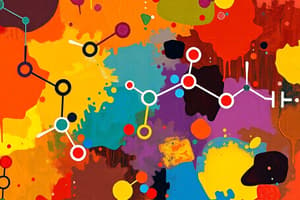Podcast
Questions and Answers
What is the hydroxyl group?
What is the hydroxyl group?
A group containing an oxygen atom connected by a covalent bond to a hydrogen atom: -OH
What is the structure of a carbonyl group?
What is the structure of a carbonyl group?
A group containing a carbon atom double-bonded to an oxygen atom: C=O
Describe the carboxyl group.
Describe the carboxyl group.
A group containing a carbon atom double bonded to an oxygen atom and single bonded to a hydroxyl group: -C(=O)OH or -COOH
What does the amino group consist of?
What does the amino group consist of?
What is the structure of a sulfhydryl group?
What is the structure of a sulfhydryl group?
Describe the phosphate group.
Describe the phosphate group.
What is the structure of a methyl group?
What is the structure of a methyl group?
What are the specific names associated with hydroxyl groups?
What are the specific names associated with hydroxyl groups?
What is the name of carbonyl groups when they are internal in a carbon skeleton?
What is the name of carbonyl groups when they are internal in a carbon skeleton?
What are carboxyl groups commonly referred to as?
What are carboxyl groups commonly referred to as?
What are amino groups known as?
What are amino groups known as?
What are sulfhydryl groups known as?
What are sulfhydryl groups known as?
What is the common name for phosphate groups?
What is the common name for phosphate groups?
What are methyl groups known as?
What are methyl groups known as?
What properties do hydroxyl groups exhibit?
What properties do hydroxyl groups exhibit?
What are the properties of carbonyl groups?
What are the properties of carbonyl groups?
What is a key property of carboxyl groups?
What is a key property of carboxyl groups?
What property do amino groups have?
What property do amino groups have?
What is a significant property of sulfhydryl groups?
What is a significant property of sulfhydryl groups?
What properties do phosphate groups possess?
What properties do phosphate groups possess?
What effect do methyl groups have on genes?
What effect do methyl groups have on genes?
Flashcards are hidden until you start studying
Study Notes
Functional Groups in Biology
- Hydroxyl Group (-OH): Composed of an oxygen atom bonded to a hydrogen atom; characteristic of alcohols, which typically end in -ol.
- Carbonyl Group (C=O): Features a carbon atom double-bonded to an oxygen atom, classified as ketones when located within a carbon skeleton and aldehydes when at the terminal position.
- Carboxyl Group (-COOH): Contains a carbon atom double-bonded to oxygen and single-bonded to a hydroxyl group; known as carboxylic acids or organic acids.
- Amino Group (-NH2): Involves a nitrogen atom bonded to two hydrogen atoms; regarded as amines and can act as a base in biological systems.
- Sulfhydryl Group (-SH): Comprises a sulfur atom bonded to a hydrogen atom; known as thiols, often found in proteins.
- Phosphate Group (PO4): Features a phosphorus atom bonded to four oxygen atoms, contributing a negative charge (-2 at molecule ends, -1 internally); involved in energy transfer processes.
- Methyl Group (CH3): Consists of a carbon atom bonded to three hydrogen atoms; addition to DNA can influence gene expression.
Properties of Functional Groups
- Hydroxyl Properties: Polar due to the electronegative oxygen, facilitating hydrogen bonding with water and aiding in organic compound solubility.
- Carbonyl Properties: Ketones and aldehydes can act as structural isomers with distinct properties; they are significant in sugar chemistry, categorized as ketoses and aldoses.
- Carboxyl Properties: Exhibits acidic properties due to the polar covalent bond between oxygen and hydrogen; commonly found in ionized form (carboxylate ion) with a charge of -1.
- Amino Properties: Basic in nature, often found as an ionized species with a charge of +1 within cells.
- Sulfhydryl Properties: Facilitate the formation of covalent bonds between two sulfhydryl groups, creating cross-links that stabilize protein structures.
- Phosphate Properties: Imparts a negative charge to molecules containing it, enhancing reactivity with water, often leading to energy release.
- Methyl Properties: Modifies DNA or associated molecules, impacting gene expression through methylation processes.
Studying That Suits You
Use AI to generate personalized quizzes and flashcards to suit your learning preferences.




